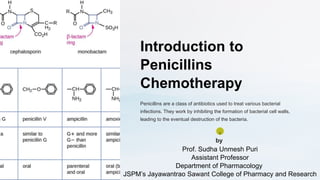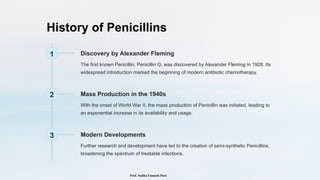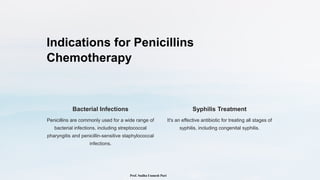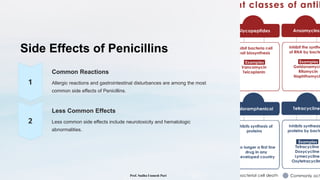Introduction to Penicillin Chemotherapy in short.pptx
Download as pptx, pdf1 like129 views
Penicillins are a class of antibiotics that work by inhibiting bacterial cell wall formation. Alexander Fleming discovered penicillin in 1928 and its widespread introduction marked the beginning of modern antibiotic chemotherapy. Further research led to developments like semi-synthetic penicillins with broader spectra. Penicillins are commonly used to treat bacterial infections like strep throat and penicillin-sensitive staph infections as well as syphilis. They can be administered orally or parenterally and have benefits but also side effects like allergic reactions. Resistance develops through enzymes and structural changes, presenting challenges to penicillin's future role in infection treatment.
1 of 10
Download to read offline










Ad
Recommended
Introduction-to-Penicillins-Chemotherapy in brief.pdf
Introduction-to-Penicillins-Chemotherapy in brief.pdfsudhaunmesh
Ěý
Penicillins are a class of antibiotics that work by inhibiting bacterial cell wall synthesis, leading to bacterial cell destruction. They were first discovered by Alexander Fleming in 1928 and mass produced during World War II. Modern developments have led to semi-synthetic penicillins with broader treatment spectrums. Common types include natural penicillins, penicillinase-resistant penicillins, and extended-spectrum penicillins. Penicillins are used to treat various bacterial infections and syphilis.penicillin discovery and mechanism its types and future off the drug
penicillin discovery and mechanism its types and future off the drugpranav20804
Ěý
slide about penicillin its discovery and mechanism
Penicillins
PenicillinsDr. Ajmer Singh Grewal
Ěý
Penicillin was the first antibiotic discovered in 1928 by Alexander Fleming. It is produced naturally by the Penicillium mold. Later, scientists were able to isolate and purify penicillin. Penicillins work by inhibiting the synthesis of peptidoglycan in bacterial cell walls, weakening and killing the bacteria. They are effective against many gram-positive bacteria and some gram-negative bacteria. Penicillins continue to be widely used today to treat infections of the skin, lungs, and other areas.Antibiotics Lecture-1-Penicillins.ppt
Antibiotics Lecture-1-Penicillins.pptAbwoneKenneth
Ěý
The document provides a history of antibiotic development from the 15th century to present day. It discusses key discoveries like Alexander Fleming's discovery of penicillin in 1929 and the mass production of penicillin starting in 1943. It then focuses on describing different classes of antibiotics like penicillins, their mechanisms of action, targets in bacteria, and developments in antibiotic resistance.penicillin drug classification and side effects
penicillin drug classification and side effectsShansub1
Ěý
Penicillin was discovered in 1928 by Alexander Fleming and was first used clinically in 1941 after purification. It works by binding to penicillin-binding proteins and inhibiting transpeptidation in bacterial cell walls, weakening the cell wall and causing the bacterial cell to burst due to osmotic pressure. There are natural, semi-synthetic, and extended spectrum forms of penicillin that vary in their acid stability, spectrum of activity, and resistance to beta-lactamases. Penicillins are used to treat a variety of bacterial infections and have potential adverse effects like hypersensitivity reactions.Penicillin
Penicillinjuanseguzman
Ěý
Penicillin is a group of antibiotics that were the first drugs effective against diseases like syphilis and staph/strep infections. They work by destroying the bacterial cell wall. There are different types including natural penicillins like penicillin G, amino penicillins like amoxicillin that can be taken orally, and resistant penicillins. Penicillin was discovered by Alexander Fleming in 1928 when mold in his laboratory contaminated a dish of staph bacteria and killed them.Penicillins
Penicillinssanjib yadav
Ěý
This document provides information on penicillins, including their historical background, classification, mechanism of action, pharmacokinetics, advantages, disadvantages, and details on specific types of penicillins like penicillin G, penicillin V, semisynthetic penicillins, and beta-lactamase inhibitors. It discusses Alexander Fleming's discovery of penicillin in 1928 and the work of Florey and Chain to isolate and purify it. The key mechanisms of action and classifications of various penicillins are summarized.1. MC III UNIT 1.pptx
1. MC III UNIT 1.pptxDhanashri Dupade
Ěý
This document provides information about the Medicinal Chemistry III course BP 601T taught by Prof. Dhanashri Dupade. The first unit covers antibiotics, including their history, nomenclature, structure-activity relationships, and important drug classes. It discusses β-lactam antibiotics like penicillin, cephalosporins, β-lactamase inhibitors, and monobactams. It also covers aminoglycosides and tetracyclines. The document then provides more detailed information about the history of antibiotic discovery and specific antibiotics like penicillin. It discusses the mechanisms of action, structure-activity relationships, classifications, and therapeutic uses of penicillin and cephalosporin classes of β-lactPenicillins
PenicillinsSANJIB YADAV
Ěý
This document provides information on penicillins, including their historical background, classification, mechanism of action, pharmacokinetics, advantages, disadvantages, and details on specific types of penicillins like penicillin G, penicillin V, semisynthetic penicillins, penicillinase resistant penicillins, broad spectrum penicillins, and beta lactamase inhibitors. It discusses Alexander Fleming's discovery of penicillin in 1928 and the work of Florey and Chain to isolate and purify it. It also outlines the mechanism of action of penicillins in inhibiting bacterial cell wall synthesis.Story of penicillin
Story of penicillinAnupama Paul
Ěý
This document provides a summary of the history and properties of penicillin. It discusses how Alexander Fleming accidentally discovered penicillin in 1928 when he observed that a mold in one of his culture dishes was releasing a substance that killed surrounding bacteria. Later researchers were able to isolate and purify penicillin, which paved the way for its clinical use. The document also describes the structure of penicillin including its beta-lactam ring and how its mechanism of action involves binding to bacterial cell walls. Common uses and side effects of penicillin are also summarized.Penicilli jajsh hsjsj hsisjs jsjsjns.ppt
Penicilli jajsh hsjsj hsisjs jsjsjns.pptnaseemazubair562
Ěý
Inhibitors of bacterial cell wall synthesis are bactericidal drugs targeting the peptidoglycan structure unique to bacteria, effective during rapid bacterial growth. Key classifications include beta-lactam drugs (like penicillins and cephalosporins) and non-beta-lactam drugs (such as vancomycin and daptomycin). Penicillins, discovered by Alexander Fleming, are among the most widely used antibiotics and have various therapeutic applications, but may lead to allergic reactions in some patients.Lecture_10_Penicillines_Part_I Presenation.pptx
Lecture_10_Penicillines_Part_I Presenation.pptxcharleschukwuogor
Ěý
Lecture_10_Penicillines_Part_I Presenation.pBeta lactams- History, Current Trend and Recent Advances
Beta lactams- History, Current Trend and Recent AdvancesAnkitaNegi32
Ěý
This document provides an overview of beta-lactam antibiotics including their history, current trends, and recent advances. It discusses the classes of beta-lactams such as penicillin, cephalosporins, carbapenems, and monobactams. The mechanisms of action and increasing bacterial resistance are also reviewed. Recent research highlights potential new applications of beta-lactams in cancer and neurological disorders as well as development of novel agents to address resistance.penicillin (1).l a part of cell wall inhibitor
penicillin (1).l a part of cell wall inhibitorRanoIjaz
Ěý
its for student of pharmacology who need more time in their life so its is easy format for u guys Pencilins
PencilinsShivaram
Ěý
Penicillins are beta-lactam antibiotics derived from 6-aminopenicillanic acid. They act by inhibiting bacterial cell wall synthesis, exposing the osmotically unstable cell membrane and causing bacterial cell lysis. Penicillins are classified based on their spectrum of activity, resistance to penicillinase, and stability in acid environments. Common classes include penicillin G, broad-spectrum penicillins, and penicillinase-resistant penicillins. Penicillins are mostly excreted unchanged in urine, with some protein binding. Adverse effects include hypersensitivity reactions and superinfections.Antibiotics: Penicillin.pdf
Antibiotics: Penicillin.pdfShaikh Abusufyan
Ěý
The document discusses the history, mechanism of action, classification, pharmacology, and clinical uses of penicillin, starting from its discovery by Alexander Fleming in 1928 to its first clinical use in 1941. It details how penicillin works by inhibiting bacterial cell wall synthesis and classifies various types of penicillins, including naturally occurring and semisynthetic forms, along with their pharmacokinetics and therapeutic applications. The document also highlights the relative safety of penicillins, potential side effects like hypersensitivity, and includes a series of questions to reinforce learning.ANTIBACTERIAL DRUGS.pdfbbdbbdndbdnsjdbdjbdj
ANTIBACTERIAL DRUGS.pdfbbdbbdndbdnsjdbdjbdjHappychifunda
Ěý
This document discusses different classes of antibacterial drugs, focusing on penicillins and cephalosporins. It describes the mechanisms of action, classifications, clinical uses and resistance mechanisms. Gram-positive bacteria have thick cell walls allowing large antibiotics to pass through, while gram-negatives have an outer membrane blocking many antibiotics. Penicillins work by inhibiting cell wall synthesis and include natural, anti-staphylococcal, and broad-spectrum types. Cephalosporins have similar mechanisms of action and are classified in generations based on spectrum of activity. Carbapenems and monobactams like aztreonam also inhibit cell wall synthesis but have even broader spectra than cephalosporins.CHEMOTHERAPY_RDP_G 3_PENICILLIN.pdf_SEM-6
CHEMOTHERAPY_RDP_G 3_PENICILLIN.pdf_SEM-6rishi2789
Ěý
This document provides information on penicillins, including their chemistry, mechanisms of action, pharmacokinetics, uses, and resistance. It discusses the penicillin nucleus consisting of fused thiazolidine and β-lactam rings. It explains that penicillins inhibit transpeptidases in bacterial cell walls, preventing cross-linking and stability. While penicillin G is rapidly excreted renally and has a narrow spectrum, semisynthetic penicillins were developed to overcome limitations like acid-lability, susceptibility to penicillinase, and narrow spectrum. Classes of semisynthetic penicillins include acid-resistant, penicillinase-resistant, and extended-spectrum varieties.Anti-infective agents1.ppt
Anti-infective agents1.pptAmosLangat5
Ěý
The document discusses various classes of anti-infective agents including antibacterial agents. It summarizes the characteristics of different generations of beta-lactam antibiotics (penicillins and cephalosporins) which work by inhibiting bacterial cell wall synthesis. Penicillins are categorized based on their spectrum of activity and susceptibility to beta-lactamases. First and second generation cephalosporins have activity against gram-positive bacteria while later generations have improved gram-negative coverage. Resistance can develop through beta-lactamase production or changes to drug targets or membrane permeability.Beta-Lactam Antibiotics Penicillins and cephalosporins.pptx
Beta-Lactam Antibiotics Penicillins and cephalosporins.pptxsapnabohra2
Ěý
The document details beta-lactam antibiotics, focusing on penicillins and their characteristics, mechanisms of action, and classifications. It covers their historical context, the chemistry of penicillin, and its antibacterial spectrum, including various forms of penicillins and their uses. Additionally, it discusses cephalosporins, their generations, and their mechanisms, addressing resistance and pharmacokinetics.penicillin Antibiotics.pptx
penicillin Antibiotics.pptxIndraj Saini
Ěý
Penicillin antibiotics were originally discovered in 1928 when Alexander Fleming observed that a mold called Penicillium was releasing a chemical that killed Staphylococcus bacteria. Penicillin works by inhibiting the bacterial enzyme transpeptidase, which is involved in cell wall synthesis. There are various types of penicillin antibiotics including penicillin G, penicillin V, methicillin, oxacillin, and amoxicillin. These antibiotics are used to treat bacterial infections such as pneumonia, meningitis, syphilis, and skin infections. They work by killing susceptible bacteria through inhibition of cell wall synthesis.Antibiotics - Penicillins
Antibiotics - PenicillinsDinesh Kumar
Ěý
This document discusses antibiotics belonging to the penicillin class, including their names, mechanisms of action, indications, routes of administration, potential side effects, and contraindications. It highlights their use in treating various infections such as respiratory issues, skin infections, and sexually transmitted diseases. Additionally, it outlines necessary monitoring, client education, and drug interactions that may affect the efficacy of penicillins.Penicillins
PenicillinsNarasimha Kumar G V
Ěý
Penicillins are beta-lactam antibiotics that were discovered in 1928 by Alexander Fleming. They work by inhibiting the final step of peptidoglycan synthesis in bacterial cell walls. There are several classes of penicillins including natural penicillins, anti-staphylococcal penicillins, and extended spectrum penicillins. They are generally well-absorbed, have varying spectra of activity, and can cause allergic reactions ranging from mild rashes to anaphylaxis. Common adverse effects include hypersensitivity reactions, neutropenia, seizures, and pseudomembranous colitis.2. PHARMACOLOGY II.pdf
2. PHARMACOLOGY II.pdfKeyaArere
Ěý
This document provides information on the classification of antibiotics, with a focus on penicillins. It discusses 10 classes of antibiotics and describes the classification, sources, mode of action, pharmacokinetics, and adverse reactions of penicillins. Specifically, it outlines natural penicillins like benzyl penicillin and synthetic penicillins including beta-lactamase resistant penicillins and extended spectrum penicillins such as ampicillin and amoxicillin/clavulinic acid.Penicillins and cephalosporin antibiotics.pptx
Penicillins and cephalosporin antibiotics.pptxarupreethu2
Ěý
The document provides an overview of penicillins and cephalosporins, two classes of beta-lactam antibiotics, detailing their discovery, classification, mechanisms of action, pharmacokinetics, adverse effects, and clinical uses. Penicillins are categorized into natural, penicillinase-resistant, extended spectrum, and anti-pseudomonal types, while cephalosporins are divided into five generations with varying activity against gram-positive and gram-negative bacteria. Adverse effects for both antibiotic classes include allergic reactions, gastrointestinal disturbances, and other complications.Anibiotics_.ppt
Anibiotics_.pptssuser15a3ce
Ěý
The document discusses antibiotics, specifically focusing on beta-lactam antibiotics such as penicillins and cephalosporins. It describes the classification, mechanisms of action, spectra of activity, pharmacokinetics and clinical uses of different generations of penicillins and cephalosporins. It also addresses antibiotic resistance and the need for rational antibiotic use based on identification of the causative organism and antibiotic susceptibility testing.Updates_in Head__Neck TNM staging- 9th edition.pptx
Updates_in Head__Neck TNM staging- 9th edition.pptxDr. Maroti Wadewale
Ěý
The Union for International Cancer Control (UICC) and the American Joint Committee on Cancer (AJCC) collaborate closely to produce the globally recognized TNM Classification of Malignant Tumours. Therefore, when discussing the "9th edition of UICC head and neck staging," it's largely in alignment with the updates introduced by the AJCC's Version 9. The UICC's TNM Core Committee finalized the 9th edition of the TNM Classification, with publication anticipated in August 2025.
The key updates for head and neck cancers in the 9th edition (or Version 9) reflect an ongoing effort to improve prognostic accuracy and align staging with contemporary clinical understanding and treatment outcomes. Here are the significant changes, particularly those relevant to head and neck:
* Emphasis on Personalized Care and Prognostic Refinements: The 9th edition reflects a greater focus on personalized care, incorporating refinements that aim to better predict patient outcomes.
* Revised Criteria for Specific Head and Neck Cancers:
* Nasopharyngeal Carcinoma (NPC): This site has seen substantial revisions, as highlighted in the previous response on AJCC updates. Key changes include:
* More precise definition of T3 disease (unequivocal evidence of bone involvement).
* Introduction of advanced radiologic extranodal extension (ENE) as an N3 criterion. This acknowledges the prognostic impact of ENE seen on imaging.
* Subclassification of M1 disease into M1a (3 or fewer metastatic lesions) and M1b (more than 3 lesions) to better stratify prognosis in metastatic settings.
* Redefined Stage Groups for NPC, with T1-2N0-1 now often falling into Stage I, and Stage IV being exclusively for metastatic disease, further subdivided by the M1a/M1b categories.
* Salivary Gland Cancers: Revised criteria based on updated imaging and anatomical features are being incorporated.
* HPV-Related Oropharyngeal Cancers: New staging is introduced for HPV-associated oropharyngeal cancers to better reflect their distinct biological behavior and prognosis, which is generally more favorable than HPV-negative oropharyngeal cancers. This often involves specific considerations for nodal burden.
* Integration of Imaging and Anatomical Features: The updates are grounded in recent evidence, incorporating insights from advanced imaging techniques and a deeper understanding of anatomical spread.
* International Collaboration: These updates are the result of collaborative efforts between the AJCC and UICC, involving input from cancer registries, clinical outcomes data, and disease-specific experts worldwide. The goal is to provide a unified and globally applicable staging system.
* Dynamic Update Process: Similar to the AJCC's shift from "Editions" to "Versions" for specific sites, the UICC is also exploring more flexible ways to share future TNM updates.
In essence, the 9th edition of the UICC staging system for head and neck cancers, particularly in areas like NPC and HPVOUR SRS SBRT EXPERIENCE BY DR KANHU CHARAN PATRO
OUR SRS SBRT EXPERIENCE BY DR KANHU CHARAN PATROKanhu Charan
Ěý
OUR SRS SBRT EXPERIENCE BY DR KANHU CHARAN PATROMore Related Content
Similar to Introduction to Penicillin Chemotherapy in short.pptx (20)
Penicillins
PenicillinsSANJIB YADAV
Ěý
This document provides information on penicillins, including their historical background, classification, mechanism of action, pharmacokinetics, advantages, disadvantages, and details on specific types of penicillins like penicillin G, penicillin V, semisynthetic penicillins, penicillinase resistant penicillins, broad spectrum penicillins, and beta lactamase inhibitors. It discusses Alexander Fleming's discovery of penicillin in 1928 and the work of Florey and Chain to isolate and purify it. It also outlines the mechanism of action of penicillins in inhibiting bacterial cell wall synthesis.Story of penicillin
Story of penicillinAnupama Paul
Ěý
This document provides a summary of the history and properties of penicillin. It discusses how Alexander Fleming accidentally discovered penicillin in 1928 when he observed that a mold in one of his culture dishes was releasing a substance that killed surrounding bacteria. Later researchers were able to isolate and purify penicillin, which paved the way for its clinical use. The document also describes the structure of penicillin including its beta-lactam ring and how its mechanism of action involves binding to bacterial cell walls. Common uses and side effects of penicillin are also summarized.Penicilli jajsh hsjsj hsisjs jsjsjns.ppt
Penicilli jajsh hsjsj hsisjs jsjsjns.pptnaseemazubair562
Ěý
Inhibitors of bacterial cell wall synthesis are bactericidal drugs targeting the peptidoglycan structure unique to bacteria, effective during rapid bacterial growth. Key classifications include beta-lactam drugs (like penicillins and cephalosporins) and non-beta-lactam drugs (such as vancomycin and daptomycin). Penicillins, discovered by Alexander Fleming, are among the most widely used antibiotics and have various therapeutic applications, but may lead to allergic reactions in some patients.Lecture_10_Penicillines_Part_I Presenation.pptx
Lecture_10_Penicillines_Part_I Presenation.pptxcharleschukwuogor
Ěý
Lecture_10_Penicillines_Part_I Presenation.pBeta lactams- History, Current Trend and Recent Advances
Beta lactams- History, Current Trend and Recent AdvancesAnkitaNegi32
Ěý
This document provides an overview of beta-lactam antibiotics including their history, current trends, and recent advances. It discusses the classes of beta-lactams such as penicillin, cephalosporins, carbapenems, and monobactams. The mechanisms of action and increasing bacterial resistance are also reviewed. Recent research highlights potential new applications of beta-lactams in cancer and neurological disorders as well as development of novel agents to address resistance.penicillin (1).l a part of cell wall inhibitor
penicillin (1).l a part of cell wall inhibitorRanoIjaz
Ěý
its for student of pharmacology who need more time in their life so its is easy format for u guys Pencilins
PencilinsShivaram
Ěý
Penicillins are beta-lactam antibiotics derived from 6-aminopenicillanic acid. They act by inhibiting bacterial cell wall synthesis, exposing the osmotically unstable cell membrane and causing bacterial cell lysis. Penicillins are classified based on their spectrum of activity, resistance to penicillinase, and stability in acid environments. Common classes include penicillin G, broad-spectrum penicillins, and penicillinase-resistant penicillins. Penicillins are mostly excreted unchanged in urine, with some protein binding. Adverse effects include hypersensitivity reactions and superinfections.Antibiotics: Penicillin.pdf
Antibiotics: Penicillin.pdfShaikh Abusufyan
Ěý
The document discusses the history, mechanism of action, classification, pharmacology, and clinical uses of penicillin, starting from its discovery by Alexander Fleming in 1928 to its first clinical use in 1941. It details how penicillin works by inhibiting bacterial cell wall synthesis and classifies various types of penicillins, including naturally occurring and semisynthetic forms, along with their pharmacokinetics and therapeutic applications. The document also highlights the relative safety of penicillins, potential side effects like hypersensitivity, and includes a series of questions to reinforce learning.ANTIBACTERIAL DRUGS.pdfbbdbbdndbdnsjdbdjbdj
ANTIBACTERIAL DRUGS.pdfbbdbbdndbdnsjdbdjbdjHappychifunda
Ěý
This document discusses different classes of antibacterial drugs, focusing on penicillins and cephalosporins. It describes the mechanisms of action, classifications, clinical uses and resistance mechanisms. Gram-positive bacteria have thick cell walls allowing large antibiotics to pass through, while gram-negatives have an outer membrane blocking many antibiotics. Penicillins work by inhibiting cell wall synthesis and include natural, anti-staphylococcal, and broad-spectrum types. Cephalosporins have similar mechanisms of action and are classified in generations based on spectrum of activity. Carbapenems and monobactams like aztreonam also inhibit cell wall synthesis but have even broader spectra than cephalosporins.CHEMOTHERAPY_RDP_G 3_PENICILLIN.pdf_SEM-6
CHEMOTHERAPY_RDP_G 3_PENICILLIN.pdf_SEM-6rishi2789
Ěý
This document provides information on penicillins, including their chemistry, mechanisms of action, pharmacokinetics, uses, and resistance. It discusses the penicillin nucleus consisting of fused thiazolidine and β-lactam rings. It explains that penicillins inhibit transpeptidases in bacterial cell walls, preventing cross-linking and stability. While penicillin G is rapidly excreted renally and has a narrow spectrum, semisynthetic penicillins were developed to overcome limitations like acid-lability, susceptibility to penicillinase, and narrow spectrum. Classes of semisynthetic penicillins include acid-resistant, penicillinase-resistant, and extended-spectrum varieties.Anti-infective agents1.ppt
Anti-infective agents1.pptAmosLangat5
Ěý
The document discusses various classes of anti-infective agents including antibacterial agents. It summarizes the characteristics of different generations of beta-lactam antibiotics (penicillins and cephalosporins) which work by inhibiting bacterial cell wall synthesis. Penicillins are categorized based on their spectrum of activity and susceptibility to beta-lactamases. First and second generation cephalosporins have activity against gram-positive bacteria while later generations have improved gram-negative coverage. Resistance can develop through beta-lactamase production or changes to drug targets or membrane permeability.Beta-Lactam Antibiotics Penicillins and cephalosporins.pptx
Beta-Lactam Antibiotics Penicillins and cephalosporins.pptxsapnabohra2
Ěý
The document details beta-lactam antibiotics, focusing on penicillins and their characteristics, mechanisms of action, and classifications. It covers their historical context, the chemistry of penicillin, and its antibacterial spectrum, including various forms of penicillins and their uses. Additionally, it discusses cephalosporins, their generations, and their mechanisms, addressing resistance and pharmacokinetics.penicillin Antibiotics.pptx
penicillin Antibiotics.pptxIndraj Saini
Ěý
Penicillin antibiotics were originally discovered in 1928 when Alexander Fleming observed that a mold called Penicillium was releasing a chemical that killed Staphylococcus bacteria. Penicillin works by inhibiting the bacterial enzyme transpeptidase, which is involved in cell wall synthesis. There are various types of penicillin antibiotics including penicillin G, penicillin V, methicillin, oxacillin, and amoxicillin. These antibiotics are used to treat bacterial infections such as pneumonia, meningitis, syphilis, and skin infections. They work by killing susceptible bacteria through inhibition of cell wall synthesis.Antibiotics - Penicillins
Antibiotics - PenicillinsDinesh Kumar
Ěý
This document discusses antibiotics belonging to the penicillin class, including their names, mechanisms of action, indications, routes of administration, potential side effects, and contraindications. It highlights their use in treating various infections such as respiratory issues, skin infections, and sexually transmitted diseases. Additionally, it outlines necessary monitoring, client education, and drug interactions that may affect the efficacy of penicillins.Penicillins
PenicillinsNarasimha Kumar G V
Ěý
Penicillins are beta-lactam antibiotics that were discovered in 1928 by Alexander Fleming. They work by inhibiting the final step of peptidoglycan synthesis in bacterial cell walls. There are several classes of penicillins including natural penicillins, anti-staphylococcal penicillins, and extended spectrum penicillins. They are generally well-absorbed, have varying spectra of activity, and can cause allergic reactions ranging from mild rashes to anaphylaxis. Common adverse effects include hypersensitivity reactions, neutropenia, seizures, and pseudomembranous colitis.2. PHARMACOLOGY II.pdf
2. PHARMACOLOGY II.pdfKeyaArere
Ěý
This document provides information on the classification of antibiotics, with a focus on penicillins. It discusses 10 classes of antibiotics and describes the classification, sources, mode of action, pharmacokinetics, and adverse reactions of penicillins. Specifically, it outlines natural penicillins like benzyl penicillin and synthetic penicillins including beta-lactamase resistant penicillins and extended spectrum penicillins such as ampicillin and amoxicillin/clavulinic acid.Penicillins and cephalosporin antibiotics.pptx
Penicillins and cephalosporin antibiotics.pptxarupreethu2
Ěý
The document provides an overview of penicillins and cephalosporins, two classes of beta-lactam antibiotics, detailing their discovery, classification, mechanisms of action, pharmacokinetics, adverse effects, and clinical uses. Penicillins are categorized into natural, penicillinase-resistant, extended spectrum, and anti-pseudomonal types, while cephalosporins are divided into five generations with varying activity against gram-positive and gram-negative bacteria. Adverse effects for both antibiotic classes include allergic reactions, gastrointestinal disturbances, and other complications.Anibiotics_.ppt
Anibiotics_.pptssuser15a3ce
Ěý
The document discusses antibiotics, specifically focusing on beta-lactam antibiotics such as penicillins and cephalosporins. It describes the classification, mechanisms of action, spectra of activity, pharmacokinetics and clinical uses of different generations of penicillins and cephalosporins. It also addresses antibiotic resistance and the need for rational antibiotic use based on identification of the causative organism and antibiotic susceptibility testing.Recently uploaded (20)
Updates_in Head__Neck TNM staging- 9th edition.pptx
Updates_in Head__Neck TNM staging- 9th edition.pptxDr. Maroti Wadewale
Ěý
The Union for International Cancer Control (UICC) and the American Joint Committee on Cancer (AJCC) collaborate closely to produce the globally recognized TNM Classification of Malignant Tumours. Therefore, when discussing the "9th edition of UICC head and neck staging," it's largely in alignment with the updates introduced by the AJCC's Version 9. The UICC's TNM Core Committee finalized the 9th edition of the TNM Classification, with publication anticipated in August 2025.
The key updates for head and neck cancers in the 9th edition (or Version 9) reflect an ongoing effort to improve prognostic accuracy and align staging with contemporary clinical understanding and treatment outcomes. Here are the significant changes, particularly those relevant to head and neck:
* Emphasis on Personalized Care and Prognostic Refinements: The 9th edition reflects a greater focus on personalized care, incorporating refinements that aim to better predict patient outcomes.
* Revised Criteria for Specific Head and Neck Cancers:
* Nasopharyngeal Carcinoma (NPC): This site has seen substantial revisions, as highlighted in the previous response on AJCC updates. Key changes include:
* More precise definition of T3 disease (unequivocal evidence of bone involvement).
* Introduction of advanced radiologic extranodal extension (ENE) as an N3 criterion. This acknowledges the prognostic impact of ENE seen on imaging.
* Subclassification of M1 disease into M1a (3 or fewer metastatic lesions) and M1b (more than 3 lesions) to better stratify prognosis in metastatic settings.
* Redefined Stage Groups for NPC, with T1-2N0-1 now often falling into Stage I, and Stage IV being exclusively for metastatic disease, further subdivided by the M1a/M1b categories.
* Salivary Gland Cancers: Revised criteria based on updated imaging and anatomical features are being incorporated.
* HPV-Related Oropharyngeal Cancers: New staging is introduced for HPV-associated oropharyngeal cancers to better reflect their distinct biological behavior and prognosis, which is generally more favorable than HPV-negative oropharyngeal cancers. This often involves specific considerations for nodal burden.
* Integration of Imaging and Anatomical Features: The updates are grounded in recent evidence, incorporating insights from advanced imaging techniques and a deeper understanding of anatomical spread.
* International Collaboration: These updates are the result of collaborative efforts between the AJCC and UICC, involving input from cancer registries, clinical outcomes data, and disease-specific experts worldwide. The goal is to provide a unified and globally applicable staging system.
* Dynamic Update Process: Similar to the AJCC's shift from "Editions" to "Versions" for specific sites, the UICC is also exploring more flexible ways to share future TNM updates.
In essence, the 9th edition of the UICC staging system for head and neck cancers, particularly in areas like NPC and HPVOUR SRS SBRT EXPERIENCE BY DR KANHU CHARAN PATRO
OUR SRS SBRT EXPERIENCE BY DR KANHU CHARAN PATROKanhu Charan
Ěý
OUR SRS SBRT EXPERIENCE BY DR KANHU CHARAN PATROUpdate on Anesthesia for Pediatric Ophthalmic Surgery.pptx
Update on Anesthesia for Pediatric Ophthalmic Surgery.pptxDr.Umang Sharma
Ěý
Based on practices on my hospital and 2021 bja articleAD-SAFE: An Initiative to Build Understanding of ARIA and Skills Needed to Gu...
AD-SAFE: An Initiative to Build Understanding of ARIA and Skills Needed to Gu...PVI, PeerView Institute for Medical Education
Ěý
Chair and Presenter, Ana M. Franceschi, MD, PhD, and Petrice M. Cogswell, MD, PhD, discuss Alzheimer’s disease in this CME/MOC/NCPD/CPE/AAPA/IPCE activity titled “AD-SAFE: An Initiative to Build Understanding of ARIA and Skills Needed to Guide Treatment Decisions and Support Rapid Recognition and Response in Radiology.” For the full presentation, downloadable Practice Aids, and complete CME/MOC/NCPD/CPE/AAPA/IPCE information, and to apply for credit, please visit us at https://bit.ly/42nd09H. CME/MOC/NCPD/CPE/AAPA/IPCE credit will be available until May 26, 2026.Viddha karma in Ayurveda-Dr Mahesh Kumar.pdf
Viddha karma in Ayurveda-Dr Mahesh Kumar.pdfCBPACS, Khera Dabar, Najafgarh New Delhi- 73
Ěý
Ayurveda have description of various treatment modalities. Viddhakarma is ayurvedic treatment method described in ancient ayurveda literature. Its actually a Vedhana karma.
Application of Viddha karma in clinical practice is now popular.ELECTROMYOGRAPHY.pptX by GOKULAKRISHNAN.
ELECTROMYOGRAPHY.pptX by GOKULAKRISHNAN.GOKULAKRISHNAN JANARTHANAN
Ěý
Electromyography is basically the study of motor unit activity.
In electromyography, the study of the electrical activity of contracting muscle provides information concerning the structure and function of the motor units.
inferential statistics Part - 1 i.e Parametric tests
inferential statistics Part - 1 i.e Parametric testsBabitha Devu
Ěý
This part deals with the Inferential Statistics.
Basic Terminologies.
Parametric Test.
T-test
paired & unpaired T -test
Z testDay care surgery anaesthesia and management of complications in postoperative...
Day care surgery anaesthesia and management of complications in postoperative...deepika582423
Ěý
Day care whooping cough community health nursing.
whooping cough community health nursing.ASWIN S
Ěý
Whooping cough for BSC 5th sem community health nursing..
This includes
Introduction
Definition
Incidence
Incubation period
Causes
Clinical manifestations
Diagnostic evaluation
Treatment
Prevention
Complications
Of whooping cough....Self-Awareness and Self-Care How Professionals Can Avoid Burnout
Self-Awareness and Self-Care How Professionals Can Avoid BurnoutOlaf Kraus de Camargo
Ěý
Closing Keynote at the IV OGĂ“LNOPOLSKA KONFERENCJA & WARSZTATY
KomunikAACja, Samoswiadomosc, Seksualnosc
June 13th – 14th, 2025
An overview of the definition and presentation of burnout in healthcare workers, strategies to prevent it and to build resilience. The presentation also explores the barriers and enablers to introducing wellness strategies in organizations.Aspirin powder or Acetyl salicylic acid powder.docx
Aspirin powder or Acetyl salicylic acid powder.docxkopalsharma85
Ěý
pharmacy exercise on aspirin powderYoga Postures to Practice
for Holistic (Physical, Mental, and Cognitive) Well...
Yoga Postures to Practice
for Holistic (Physical, Mental, and Cognitive) Well...Bhoj Raj Singh
Ěý
An ancient System for holistic health (mental and physical) and wellbeing, is a scientific art of living with harmony (connecting) of mind and body. Although much more ancient than Patanjali, who documented yoga systematically about 2000 years ago, Patanjali is often referred to as the "father of modern yoga."
Yoga postures are commonly depicted in ancient paintings, carvings, and sculptures in almost all civilizations and religions, thus Yoga can’t be described as an act of Hinduism. It originated long before any religion on Earth, with the emergence of life on the Planet. All yoga poses are natural, and what is not natural is not yoga; it isĚýViyoga.
Besides Vedic Yoga, Hatha, Vinyasa, Ashtanga, Iyengar, Yin, Restorative, Kundalini, Bikram, Sahaj, and Power yoga are some popular types.
VinyasaĚýYoga is the closest form to Vedic Yoga; it is known for its flowing movements, not very rigorous, not too much straining, actions flow with the breath.
Though all yoga may lead to meditation (Dhyan) for your inner upliftment, it is not the same as described in Hinduism for self-liberation.
In Hinduism, different paths of life looking distinct but can be practiced all together, they are: Karma Yoga (selfless action and service), Bhakti Yoga (devotion and love for God or Godly power), Jnana (Gyan) Yoga (gaining knowledge for self-realization through wisdom), Dhyan Yoga (meditation) and Kriya Yoga (optimum utilization of your vital and muscular energy).Ěý
COUGH AND THIER DRUGS AND MODE OF ACTION.pptx
COUGH AND THIER DRUGS AND MODE OF ACTION.pptxPackialakshmiP
Ěý
COUGH AND THIER DRUGS AND MODE OF ACTIONUnlocking the Potential of Long-Acting PrEP to Halt HIV Transmissions
Unlocking the Potential of Long-Acting PrEP to Halt HIV TransmissionsPVI, PeerView Institute for Medical Education
Ěý
Chair, Allison Agwu, MD, ScM, FAAP, FIDSA, discusses HIV in this CME/MOC/NCPD/CPE/AAPA/IPCE activity titled “Unlocking the Potential of Long-Acting PrEP to Halt HIV Transmissions.” For the full presentation, downloadable Practice Aids, and complete CME/MOC/NCPD/CPE/AAPA/IPCE information, and to apply for credit, please visit us at https://bit.ly/40Mr2AC. CME/MOC/NCPD/CPE/AAPA/IPCE credit will be available until June 12, 2026.Clinical Signs Overview: PICCKLE Mnemonic
Clinical Signs Overview: PICCKLE MnemonicDr Aman Suresh Tharayil
Ěý
This presentation provides a concise yet comprehensive review of common clinical signs and their diagnostic significance, summarized under the acronym PICCKLE – Pallor, Icterus, Clubbing, Cyanosis, Koilonychia, Lymphadenopathy, and Edema. Each condition is defined, followed by key causes, pathophysiology, diagnostic techniques, and clinical relevance. The content is tailored for undergraduate and postgraduate students in medicine and pharmacy, as well as early-career clinicians seeking to reinforce their clinical examination skillsCell Injuri. pathophpysiology sem- II B Pharmacypptx
Cell Injuri. pathophpysiology sem- II B PharmacypptxUmeshMali25
Ěý
This presentation provides a comprehensive overview of cell injury, a fundamental concept in pathology. It covers the causes, types (reversible and irreversible), mechanisms of injury (including hypoxia, free radicals, and chemical agents), and the morphological and biochemical changes that occur during cell injury. The slides are ideal for medical, pharmacy, and life sciences students preparing for pathology coursework or exams.
AD-SAFE: An Initiative to Build Understanding of ARIA and Skills Needed to Gu...
AD-SAFE: An Initiative to Build Understanding of ARIA and Skills Needed to Gu...PVI, PeerView Institute for Medical Education
Ěý
Unlocking the Potential of Long-Acting PrEP to Halt HIV Transmissions
Unlocking the Potential of Long-Acting PrEP to Halt HIV TransmissionsPVI, PeerView Institute for Medical Education
Ěý
Ad
Introduction to Penicillin Chemotherapy in short.pptx
- 1. Introduction to Penicillins Chemotherapy Penicillins are a class of antibiotics used to treat various bacterial infections. They work by inhibiting the formation of bacterial cell walls, leading to the eventual destruction of the bacteria. S by Prof. Sudha Unmesh Puri Assistant Professor Department of Pharmacology JSPM’s Jayawantrao Sawant College of Pharmacy and Research
- 2. History of Penicillins 1 Discovery by Alexander Fleming The first known Penicillin, Penicillin G, was discovered by Alexander Fleming in 1928. Its widespread introduction marked the beginning of modern antibiotic chemotherapy. 2 Mass Production in the 1940s With the onset of World War II, the mass production of Penicillin was initiated, leading to an exponential increase in its availability and usage. 3 Modern Developments Further research and development have led to the creation of semi-synthetic Penicillins, broadening the spectrum of treatable infections. Prof. Sudha Unmesh Puri
- 3. Mechanism of Action of Penicillins 1 Inhibition of Cell Wall Synthesis Penicillins disrupt the formation of peptidoglycan cross-links in the bacterial cell wall, leading to bacterial cell death. 2 Specificity for Bacterial Cells They have a selective action as they target the structural components unique to bacterial cells, sparing human cells. 3 Time- and Concentration-Dependent Killing Their efficacy is related to the duration and concentration of drug exposure. Prof. Sudha Unmesh Puri
- 4. Types of Penicillins Natural Penicillins Include Penicillin G and Penicillin V. They are effective against many Gram-positive bacteria. Penicillinase- Resistant Penicillins Developed to counteract beta-lactamase-producing bacteria. Examples include oxacillin and dicloxacillin. Extended-Spectrum Penicillins Have a broader spectrum of activity, including some Gram- negative bacteria. This group includes ampicillin and amoxicillin. Prof. Sudha Unmesh Puri
- 5. Indications for Penicillins Chemotherapy Bacterial Infections Penicillins are commonly used for a wide range of bacterial infections, including streptococcal pharyngitis and penicillin-sensitive staphylococcal infections. Syphilis Treatment It's an effective antibiotic for treating all stages of syphilis, including congenital syphilis. Prof. Sudha Unmesh Puri
- 6. Dosage and Administration of Penicillins Oral Administration Most Penicillins can be taken orally, ensuring convenient at-home treatment for many infections. Parenteral Administration Some patients may require intramuscular or intravenous administration for more severe infections. Prof. Sudha Unmesh Puri
- 7. Side Effects of Penicillins Common Reactions Allergic reactions and gastrointestinal disturbances are among the most common side effects of Penicillins. Less Common Effects Less common side effects include neurotoxicity and hematologic abnormalities. Prof. Sudha Unmesh Puri
- 8. Resistance to Penicillins 1 Beta-Lactamase Production Many bacteria produce beta- lactamases, enzymes that inactivate Penicillins, leading to resistance. 2 Change in Penicillin- Binding Proteins Mutations in penicillin-binding proteins can reduce the affinity for Penicillins, resulting in resistance. Prof. Sudha Unmesh Puri
- 9. Comparison of Penicillins with Other Antibiotics Penicillins Cephalosporins Macrolides Effective against gram- positive bacteria Broad-spectrum coverage Effective against atypical bacteria Prof. Sudha Unmesh Puri
- 10. Conclusion and Future Prospects of Penicillins Chemotherapy Impact on Medicine Penicillins have revolutionized medicine, saving countless lives and providing hope for the treatment of bacterial infections. Future Challenges Emergence of antibiotic resistance and the need for novel agents pose significant challenges for the future of Penicillin therapy. Prof. Sudha Unmesh Puri